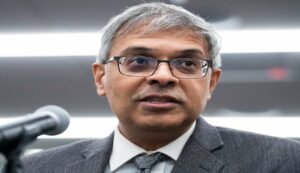What has Dr. Jay Bhattacharya said about Anthony Fauci after he was picked to lead the National Institutes of Health?
Washington: President-elect Donald Trump’s choice to head the National Institutes of Health, Dr. Jay Bhattacharya, continues to be a strong opponent of Dr. Anthony Fauci‘s approach to the COVID-19 pandemic.

In a statement released on Tuesday, Trump said he had appointed Stanford University School of Medicine professor Bhattacharya to oversee the country’s top medical research organization. In order “to direct the nation’s medical research and to make important discoveries that will improve health and save lives,” he added, Bhattacharya would collaborate with Robert F. Kennedy Jr., his choice to lead the Department of Health and Human Services.
“Together, Jay and RFK Jr. will restore the NIH to a Gold Standard of Medical Research as they examine the underlying causes of and solutions to America’s biggest health challenges, including our crisis of chronic illness and disease.”
The nomination, according to Bhattacharya, “honored and humbled” him. “We will reform American scientific institutions so that they are worthy of trust again and will deploy the fruits of excellent science to make America healthy again!” On X, Bhattacharya wrote.
The Great Barrington Declaration, an open statement released in October 2020 that opposed lockdowns and supported “herd immunity,” the notion that low-risk individuals should be let to develop immunity to COVID-19 via infection, was authored in large part by Bhattacharya. Public health experts, including Francis Collins, the head of the NIH at the time, condemned it as harmful.
Fauci and other authorities, according to Bhattacharya, have marginalized those who disagreed with lockdown measures. After normal business hours, Bhattacharya and Fauci were contacted for comment.
Last year, Bhattacharya said on Fox News that Fauci and Collins “created an illusion of scientific consensus around their ideas and marginalized anyone that disagreed with them even though there wasn’t a scientific consensus.” “It’s a pattern of behavior that reflects an abuse of power by American scientific bureaucrats at the very top of our scientific bureaucracies.”
Early in 2020, Fauci became the public face of the government’s reaction to COVID-19, but he eventually lost favor with then-President Trump because he insisted on prudence while Trump wanted a quicker return to regular life. Before retiring in 2022, Fauci oversaw the NIH’s National Institute of Allergy and Infectious Diseases for over 40 years.
Last year, Fauci told the New York Times Magazine, “I don’t mean to seem preachy, but I don’t want to see people suffer and I don’t want to see people die.” Fauci has defended actions taken during the epidemic.
Bhattacharya said in 2021 that Fauci was “probably the number one anti-vaxer” because of his persistent insistence that Americans adhere to COVID-19 mitigation strategies even if they had received the vaccine.
“Dr. Fauci is probably the number one anti-vaxxer in the country in some sense, because he has modeled behavior that has made people think the vaccine won’t give you back your life, but it will,” he said on Fox News.
Additionally, Bhattacharya has charged Fauci and other officials with stifling scientific discourse and research during the outbreak.
He wrote, “The rot, having accumulated over decades, was plain for all to see,” in an opinion article that appeared earlier in November on the British news and opinion website UnHerd. “The National Institutes of Health, whose annual budget is $45 billion, orchestrated under the leadership of Francis Collins and Anthony Fauci a massive suppression of scientific debate and research.”
In a 2022 Newsweek op-ed, Bhattacharya and Harvard Medical School professor and epidemiologist Martin Kulldorff questioned Fauci’s response to the epidemic.
When COVID-19 struck, the public and media “naturally looked” to Fauci, they wrote. “Unfortunately, Dr. Fauci got major epidemiology and public health questions wrong.”
Last year, they urged a panel to carry out “a thorough and open-minded” investigation of the epidemic in another opinion piece for Newsweek.
“While few public health scientists dared to speak out against COVID restrictions promoted by Dr. Anthony Fauci, many of the scientists who did speak out are politically on the left, including several members of our Norfolk Group,” they said. “We must skip the politics and simply figure out what went wrong so that it never happens again.”